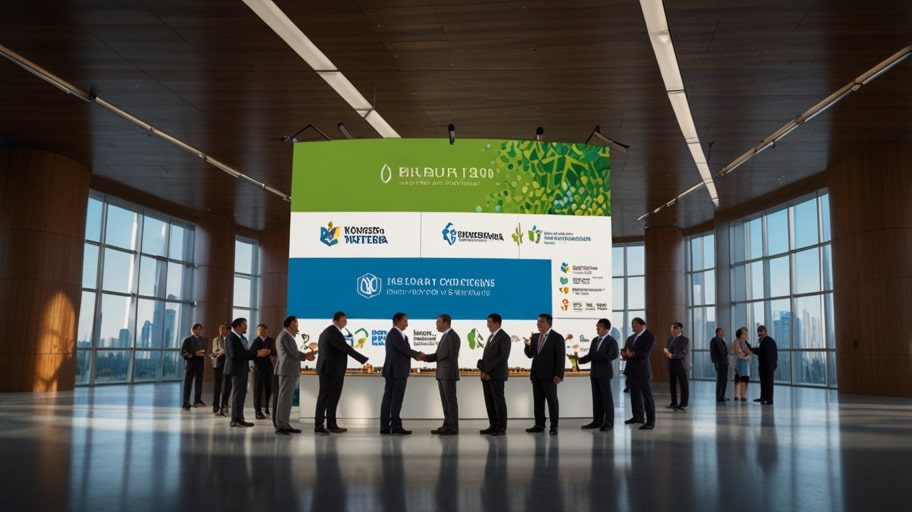In a revolutionary deal that will impact the agribusiness sector across the world, Viterra and Bunge two major agricultural commodity businesses formally sealed this US$8.2 billion merger on July 3, 2025. This major deal, being one of the biggest in the industry this year, makes the two companies a giant in the international grain and oilseed business and the new organization is likely to stand its ground against the big players in the industry such as Cargill and Archer Daniels Midland. Ever since it was initially announced in 2023, the merger has become widely followed by investors and analysts to see how it could transform supply chains and how commodity prices will go.
Merger Details
The merger unites a U.S.-based global agribusiness company, Bunge, with the Canadian agricultural giant, Viterra, which is a Glencore and Canadian pension fund-owned company. Its transaction of 8.2 billion USD encompasses those resources in both cash and equity, whereas Bunge buys Viterra to become one of the largest Agri businesses in the world. The merged company, which will trade under the Bunge name, will have its headquarters in St. Louis, Missouri, and will target to achieve annual revenues of over 70 billion dollars, by use of its vast network of processing plants, storage terminals, and distribution channels located in North America, South America and Europe.
The deal will promote the portfolio of Bunge since it will combine the solid grain handling capabilities and oilseed processing of Viterra. This strategic fit strengthens the firm to screen the international markets, especially in parts where there is an increase in demand for crops such as soybeans, corn, and wheat. The merger also increases the presence of Bunge in Canada, where Viterra is a leading company in grain handling, and enhances its supply chain strength in times of climate change and geopolitical issues, creating havoc around the globe.
Strategic Implications
The merger will be completed strengthening Bunge through this merger as a fierce rival in the agribusiness industry, which is gradually merging. The merger of Viterra into the existing operations of Bunge will increase their economies of scale since the new company can afford to minimize costs and increase margins in an uncertain commodity trade. The acquisition also improves the capability of Bunge to contend with breakdowns in the supply chain, which have occurred in the past, as was experienced when the Russia-Ukraine conflict disrupted the export of grain.
Analysts point out that the merger follows the trend of the industrywide syndrome of consolidation, where companies are trying to avoid the risk of a dynamic commodity price and regulatory pressures. It is anticipated that the entity, integrated, will spend heavily in the areas of sustainable practices, such as precision agriculture, carrying a neutral supply chain, to address an increasing concern of environmentally-responsible food production. Such an emphasis is especially timely because governments and consumers across the world are interested in more sustainable farming methods.
Effect on the Financial and Market
The financial impact of the merger is huge on both the firms and their shareholders. On July 3, 2025, shares of Bunge listed on the New York Stock Exchange with a ticker symbol BG rose by 3.5% to close at $112.67 as investors showed optimism on whether the deal would bring long-term growth. It will provide annual cost synergies of $1 billion in three years fueled by operations that are lean with minimized overheads. The transaction, however, is coupled with a 4 billion assumed Viterra debt that may be a problem should the price of commodities fall or the interest rates increase.
Concerns about its implications on competition have been posed in the agribusiness sector, given the fact that the market has been experiencing concentration, and that the merger between Bunge-Viterra was a major issue of concern. Canada, the U.S., and the European Union regulatory bodies scrutinised the deal, which was eventually approved with very few divestitures. However, the critics state that the merging would increase the price to the farmers and the end-users especially where there is a heavier concentration of grain exports.
Industry Context
The agricultural business is making its way through a tricky environment characterized by climate change, trade conflict as well as changing consumer behaviors. In recent years, commodity markets have become more volatile, with issues affecting the supply chain and weather factors affecting crop yields. The merger between Bunge and Viterra will enable the company to cope with some of these issues as it will de-concentrate its sourcing region and increase its logistics competence. It is also arriving when other industry rivals, such as Cargill, are making investments in alternative proteins, and sustainable agricultural production as industries move toward innovation.
Future Outlook
In the future, Bunge will use its increased size to be more innovative in the agribusiness field and put an emphasis on the digitalization of their farming activities to make them more efficient and less harmful to the environment. It is planning to increase its operations in high-growth markets, especially in Asia, where the demand for soybeans and edible oils is on the increase. Secondly, it is believed that Bunge will focus on the minimisation of debts to build up its balance sheet, so that it could have financial leeway in case of any future investments.
The completion of the merger has opened a new door at Bunge and Viterra and the new entity will become a global leader in agribusiness. Because the company is inculcating its operations, its capacity to meet the promised synergies will be watched zealously by the stakeholders as they provide tolerance to regulatory and market issues. As the world population is expected to be 9 billion people by 2050, the work of such agribusiness giants as Bunge will remain imperative to help guarantee food security at the level of agricultural sustainability.
